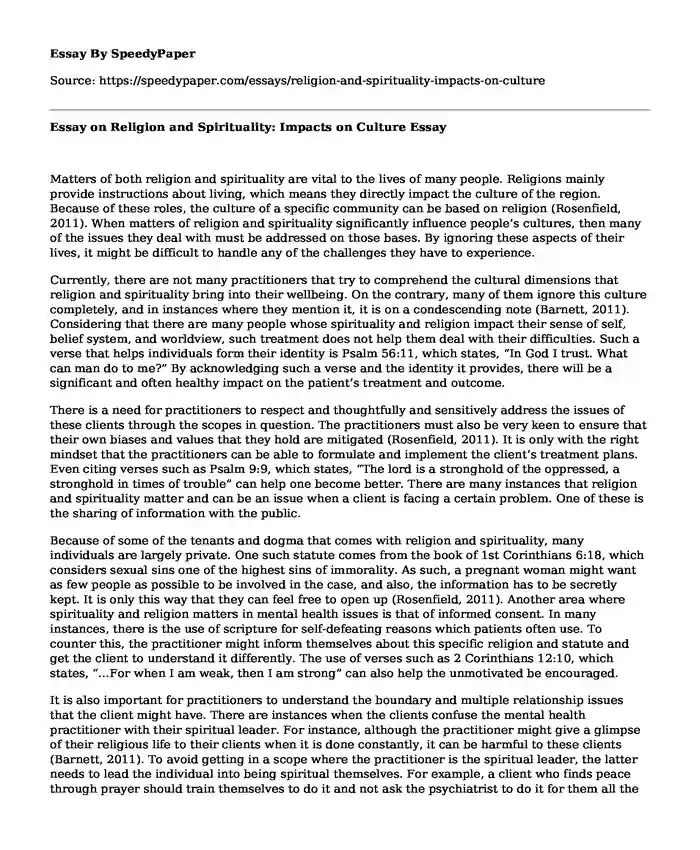Matters of both religion and spirituality are vital to the lives of many people. Religions mainly provide instructions about living, which means they directly impact the culture of the region. Because of these roles, the culture of a specific community can be based on religion (Rosenfield, 2011). When matters of religion and spirituality significantly influence people’s cultures, then many of the issues they deal with must be addressed on those bases. By ignoring these aspects of their lives, it might be difficult to handle any of the challenges they have to experience.
Currently, there are not many practitioners that try to comprehend the cultural dimensions that religion and spirituality bring into their wellbeing. On the contrary, many of them ignore this culture completely, and in instances where they mention it, it is on a condescending note (Barnett, 2011). Considering that there are many people whose spirituality and religion impact their sense of self, belief system, and worldview, such treatment does not help them deal with their difficulties. Such a verse that helps individuals form their identity is Psalm 56:11, which states, “In God I trust. What can man do to me?” By acknowledging such a verse and the identity it provides, there will be a significant and often healthy impact on the patient’s treatment and outcome.
There is a need for practitioners to respect and thoughtfully and sensitively address the issues of these clients through the scopes in question. The practitioners must also be very keen to ensure that their own biases and values that they hold are mitigated (Rosenfield, 2011). It is only with the right mindset that the practitioners can be able to formulate and implement the client’s treatment plans. Even citing verses such as Psalm 9:9, which states, “The lord is a stronghold of the oppressed, a stronghold in times of trouble” can help one become better. There are many instances that religion and spirituality matter and can be an issue when a client is facing a certain problem. One of these is the sharing of information with the public.
Because of some of the tenants and dogma that comes with religion and spirituality, many individuals are largely private. One such statute comes from the book of 1st Corinthians 6:18, which considers sexual sins one of the highest sins of immorality. As such, a pregnant woman might want as few people as possible to be involved in the case, and also, the information has to be secretly kept. It is only this way that they can feel free to open up (Rosenfield, 2011). Another area where spirituality and religion matters in mental health issues is that of informed consent. In many instances, there is the use of scripture for self-defeating reasons which patients often use. To counter this, the practitioner might inform themselves about this specific religion and statute and get the client to understand it differently. The use of verses such as 2 Corinthians 12:10, which states, “...For when I am weak, then I am strong” can also help the unmotivated be encouraged.
It is also important for practitioners to understand the boundary and multiple relationship issues that the client might have. There are instances when the clients confuse the mental health practitioner with their spiritual leader. For instance, although the practitioner might give a glimpse of their religious life to their clients when it is done constantly, it can be harmful to these clients (Barnett, 2011). To avoid getting in a scope where the practitioner is the spiritual leader, the latter needs to lead the individual into being spiritual themselves. For example, a client who finds peace through prayer should train themselves to do it and not ask the psychiatrist to do it for them all the time.
Religious and spiritual beliefs are important in the lives of many individuals today. So deep is this belief and adherence to religious and spiritual beliefs that it represents entire cultures. Because some cultures are significantly based on religion and spirituality, most of the difficulties and hardships that people undergo are somehow influenced by these two areas. Despite this dominance of religious and spiritual issues in the lives of Americans, many psychiatrists do not think it is an important aspect to be proficient in. However, there is value in acknowledging the spirituality and religions of the clients as it can help in their treatment process and outcomes.
References
Barnett, J. E. (2011). Integrating spirituality and religion into psychotherapy: Persistent dilemmas, ethical issues, and a proposed decision-making process. Ethics & Behavior, 27(2), 147-164.
Rosenfield, G. W. (2011). Contributions from ethics and research that guide integrating religion into psychotherapy. Professional Psychology: Research and Practice, 42(2), 192-199. Retrieved from Retrieved from https://search-ebscohost-com.ezproxy.ccu.edu/login.aspx?direct=true&db=pbh&AN=59530434&site=eds-live
Cite this page
Essay on Religion and Spirituality: Impacts on Culture. (2023, Oct 15). Retrieved from https://speedypaper.com/essays/religion-and-spirituality-impacts-on-culture
Request Removal
If you are the original author of this essay and no longer wish to have it published on the SpeedyPaper website, please click below to request its removal:
- Book Review Essay Sample: Dharma in Hell
- Essay Example on Cultural Encounters Manifestation in Literary Works
- Essay Example on the Iconoclastic Controversy
- Paper Example. Progressive Era and the Gilded Age
- Free Essay Example. Strong Organizational Cultures
- Free Essay - Multicultural Aspects and Therapies Related to Schizophrenia
- Free Essay - Solitude and Catholicism
Popular categories





